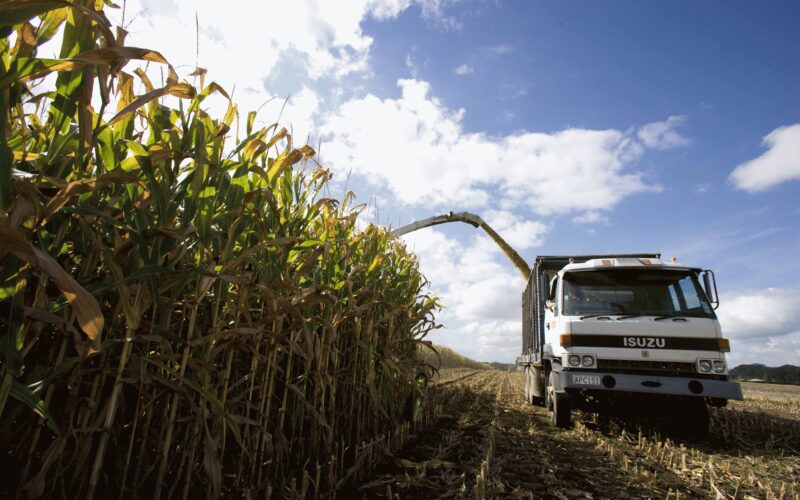Call for maize grain growers to unite

New Zealand’s maize grain industry is facing a crisis of trust between growers and companies. Low prices and poor communication have led to frustration and losses for farmers. Consultant Grant McDonald says growers need to form an alliance to share information and negotiate better contracts. Wairoa Federated Farmers arable chair Allan Newton suggests 18-month contracts to provide certainty and reduce grain imports. Companies like Viterra claim to build lasting relationships with growers, but farmers feel they are price takers with little control over the industry.
In the 40 years that Grant McDonald has worked in the maize grain industry, he has never seen relations between growers and companies at such a low ebb.
Low prices and poor communication between growers and companies that purchase maize grain have affected trust between the two parties, he said.
McDonald, who is a forage and cropping consultant with Feilding-based company H&T, said growers he deals with are making a loss as a result of low contracts being offered in the 2023-2024 season.
“A lot of them didn’t accept the pricing in spring and sat on the fence and the price being offered then was $520/tonne.”
At that price, many would have broken even this season. However, McDonald said it was $100 less than what was offered the previous season and there had been little explanation from any of the companies about why the price had fallen.
That lack of communication around pricing exemplifies many of the issues the grain industry in New Zealand is facing and it is immensely frustrating, he said.
“Growers in New Zealand need to get together and form some sort of alliance with each other. I know there are commercial considerations in that statement, but unless they are talking to each other and sharing information like I try to share to my customers, then they all get bamboozled by bullshit.”
He recalled cases where a company representative tells one story to one grower and a different story to another.
McDonald said he then hears both stories because both farmers are his clients.
“It’s incredibly frustrating, it’s emotive as well and it doesn’t augur well for trust.
“You get a different story on a different day from a different person all the time.
“NZ farming and farming relationships are built on trust and that trust is being destroyed and unless there’s some transparency and openness and consistency in messaging then no one will want to be in this industry.
“In my 40 years I’ve had in the arable industry I don’t think I’ve had as many conversations around this [with growers] ever.”
Wairoa Federated Farmers arable chair Allan Newton agreed with much of McDonald’s assertions.
He said a possible solution could be to have 18-month contracts, which would give farmers peace of mind and enable them to properly financially plan their business with certainty.
Ideally farmers should be negotiating for the 2026 planting right now, so companies know what is going in the ground 18 months out and allowing farmers to grow the best crop they can to meet their requirements.
It could also reduce the size of grain imports, he said.
“We could produce in harmony together if we were contracted out to 18 months. We would know where we stand and we would know whether we could make a profit.”
Buyers would also know how much grain they would have – subject to adverse events.
This type of contract would help restore trust in the industry, he said.
He said there are limited options for farmers because of the small size of their industry, which makes them price takers.
“Unless we can get a 100% boycott and 100% unity there’s nothing we can actually do. It comes back to the saying, united we stand, divided we fall.”
Growers banding together is great in theory, but he fears companies will create division by offering deals to the group’s weakest link.
“There’s always someone who is willing to accept a few cents more,” he said.
In some years, they will offer a contract price and then a month later offer a second contract that is $20-$40/t less.
“On one occasion in the past 10 years, they have come back later in the season and offered a higher price.”
It made it impossible to do any forward planning and as a result farmers need a high yielding crop to balance out the price uncertainty, he said.
Alternative pricing mechanisms are discussed “all the time” but never eventuate because the industry is so small and fragmented.
“We have no control over our own industry. We are only price takers.”
It is not a business model that is sustainable over the long term and Newton hopes the Ministry for Primary Industries can step in and provide financial assistance to growers around helping out with trucking and drying costs “because the system is out of our control and we are victims of a financial disaster not created by ourselves and we are locked into an industry”.
“If they could top us up with something, it could mean the survivability of some farmers.”
Farmers Weekly contacted Canada-based grain company Viterra and asked about its relationship with growers and issues around trust.
In a response to emailed questions, Viterra country manager NZ Todd Ormandy said:
“We build lasting relationships with our customers, bringing local growers and consumers together and matching supply with demand.
“Viterra is the second largest maize dryer operator in NZ with drying operations in Te Awamutu and Te Puke. We support New Zealand maize growers through the whole process from crop establishment to harvest and delivery.
“Growers can source seed and chemicals from us to grow maize and receive on farm and phone support from our experienced team throughout the growing process.
“We have a number of long-term loyal grower customers and take pride in providing our best price on any given day within the markets we operate. This requires balancing customer needs versus grower returns.
“Commodity markets move every day, growers and customers have choice when to participate, our job is to facilitate the supply between these counterparts as well as provide timely information.”
Source Link : https://www.farmersweekly.co.nz/news/call-for-maize-grain-growers-to-unite/

















